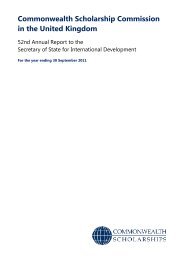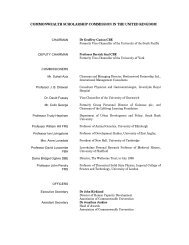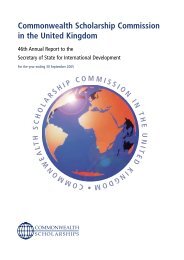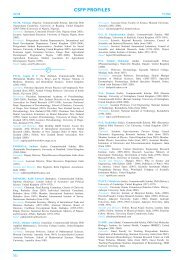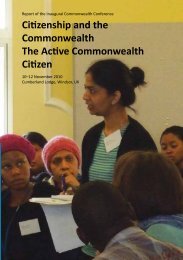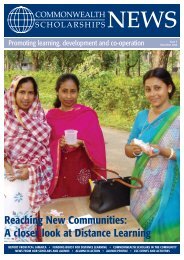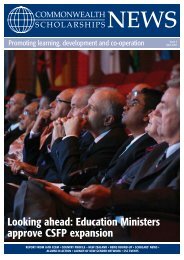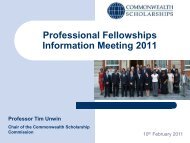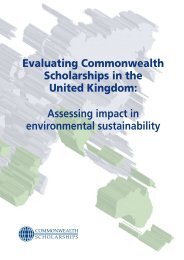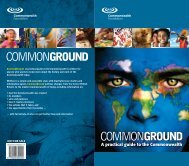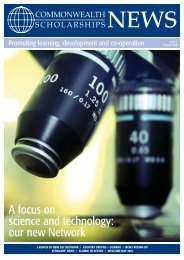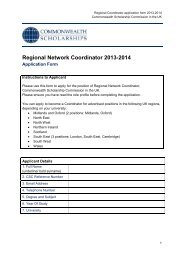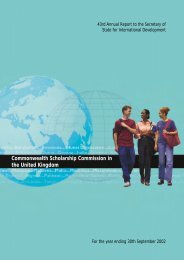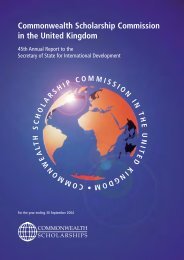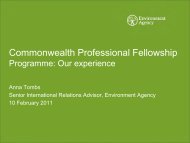Issue 6 - Commonwealth Scholarship Commission in the United ...
Issue 6 - Commonwealth Scholarship Commission in the United ...
Issue 6 - Commonwealth Scholarship Commission in the United ...
Create successful ePaper yourself
Turn your PDF publications into a flip-book with our unique Google optimized e-Paper software.
COUNTRY PROFILE – INDIA<br />
In this issue’s country profile,<br />
Professor Sur<strong>in</strong>der S Jodhka and<br />
Dhruv Ra<strong>in</strong>a, from <strong>the</strong> Sociology<br />
Department at Jawaharlal Nehru<br />
University, look at <strong>the</strong> impact of<br />
<strong>the</strong> CSFP <strong>in</strong> India.<br />
The first batch of 54 <strong>Commonwealth</strong> Scholars<br />
and Fellows left India <strong>in</strong> 1960 – 36 went to <strong>the</strong><br />
UK, 14 to Canada, 2 to Australia and 2 to New<br />
Zealand. India was one of <strong>the</strong> first countries to<br />
actively participate <strong>in</strong> <strong>the</strong> <strong>Commonwealth</strong><br />
<strong>Scholarship</strong> and Fellowship Plan (CSFP). Over <strong>the</strong><br />
years, <strong>the</strong> number of Scholars dest<strong>in</strong>ed for <strong>the</strong> UK<br />
has rema<strong>in</strong>ed steady, and <strong>the</strong> number of Scholars<br />
opt<strong>in</strong>g for Canada, Australia and New Zealand has<br />
<strong>in</strong>creased gradually.<br />
Between 1960 and 2002, <strong>the</strong> flow of students from<br />
India was consistent and a total of 3304 Scholars and<br />
Fellows travelled to pursue higher studies <strong>in</strong><br />
<strong>Commonwealth</strong> countries under <strong>the</strong> Plan, of which<br />
81% went to <strong>the</strong> UK, 15% to Canada, 2% to Australia<br />
and 1% to New Zealand. A very small number of<br />
Indian Scholars chose o<strong>the</strong>r <strong>Commonwealth</strong><br />
countries to pursue <strong>the</strong>ir studies or professional<br />
tra<strong>in</strong><strong>in</strong>g. India has also been an important host<br />
country for <strong>Commonwealth</strong> Scholars and Fellows. A<br />
total of 672 Scholars and Fellows pursued <strong>the</strong>ir<br />
higher studies <strong>in</strong> India between 1960 and 2002. The<br />
largest number of <strong>the</strong>m came from Mauritius (109),<br />
followed by <strong>the</strong> UK (86) and Sri Lanka (66).<br />
WHO WERE THEY AND HOW DID THEY GET<br />
SELECTED?<br />
In India, two agencies coord<strong>in</strong>ate <strong>the</strong> selection<br />
process for <strong>the</strong> CSFP: <strong>the</strong> M<strong>in</strong>istry of Human<br />
Resource Development (MHRD) and <strong>the</strong> University<br />
Grants <strong>Commission</strong> (UGC). Over <strong>the</strong> last eight to ten<br />
years, <strong>the</strong> MHRD has received more than 3000<br />
applications annually for some 60 nom<strong>in</strong>ations to<br />
<strong>the</strong> UK alone. The <strong>Scholarship</strong> and Fellowship<br />
applications sent to <strong>the</strong> UGC are routed through <strong>the</strong><br />
universities where <strong>the</strong> applicants are employed. This<br />
accounts for an average of 350-400 applications<br />
annually to <strong>the</strong> UGC for 90-95 nom<strong>in</strong>ations.<br />
An email survey of 106 CSFP alumni carried out<br />
dur<strong>in</strong>g April-August 2007 provided <strong>in</strong>terest<strong>in</strong>g<br />
<strong>in</strong>formation. Most (85%) of <strong>the</strong> former<br />
<strong>Commonwealth</strong> Scholars and Fellows were<br />
employed full-time at <strong>the</strong> time of selection. In terms<br />
of <strong>the</strong>ir religious backgrounds, <strong>the</strong> alumni<br />
represented <strong>the</strong> overall diversity of <strong>the</strong> Indian<br />
population. However, <strong>the</strong> percentage representation<br />
of Muslims was far below<br />
<strong>the</strong>ir proportion <strong>in</strong> <strong>the</strong><br />
Indian population.<br />
Similarly, <strong>the</strong> caste breakup<br />
reflected a substantial<br />
presence of <strong>the</strong> upper and<br />
middle caste groups.<br />
Predictably, most alumni<br />
(84%) had middle- and<br />
upper-class backgrounds.<br />
Only 3% of <strong>the</strong><br />
respondents described<br />
<strong>the</strong>ir family background as<br />
poor/work<strong>in</strong>g-class.<br />
Similarly, <strong>in</strong> terms of<br />
gender profile, 82% of <strong>the</strong> former award holders<br />
were male. However, <strong>the</strong> average age of <strong>the</strong> women<br />
respondents was lower than <strong>the</strong>ir male counterparts<br />
– half of <strong>the</strong>m were below 30 at <strong>the</strong> time of <strong>the</strong>ir<br />
award, <strong>in</strong> contrast to only a third of <strong>the</strong> male award<br />
holders <strong>in</strong> a similar category. Gender differences also<br />
appeared <strong>in</strong> <strong>the</strong> discipl<strong>in</strong>ary orientation of <strong>the</strong><br />
alumni. 50% of female respondents pursued<br />
science, technology and medic<strong>in</strong>e, while <strong>the</strong><br />
proportion of men <strong>in</strong> <strong>the</strong> same categories was much<br />
larger (79%). The representation of women <strong>in</strong> <strong>the</strong><br />
social sciences and humanities was higher.<br />
MOTIVATIONS AND REWARDS<br />
The most obvious motivation for apply<strong>in</strong>g for a<br />
<strong>Commonwealth</strong> <strong>Scholarship</strong> is to enhance one’s<br />
career options. A doctoral degree, postdoctoral<br />
research or tra<strong>in</strong><strong>in</strong>g <strong>in</strong> <strong>the</strong> developed world is<br />
valued by Indian universities and o<strong>the</strong>r<br />
professional organisations. In addition, <strong>the</strong> tenure<br />
Himalayan glaciers<br />
Indian Scholars prepar<strong>in</strong>g to take a group photo<br />
at <strong>the</strong> 2005 CSC Welcome Day<br />
abroad augments <strong>the</strong> social capital of an<br />
academic. As one of <strong>the</strong> respondents put it, <strong>the</strong><br />
st<strong>in</strong>t abroad added to ‘one’s stature <strong>in</strong> <strong>the</strong><br />
community, socially and professionally. Even<br />
when <strong>the</strong>re were no immediate promotions, it<br />
found mention <strong>in</strong> all <strong>the</strong> official documents’.<br />
Fur<strong>the</strong>rmore, 67.9% of <strong>the</strong> respondents felt that<br />
<strong>the</strong> experience improved <strong>the</strong>ir ‘professional skills<br />
<strong>in</strong> terms of teach<strong>in</strong>g and research’, while as many<br />
respondents felt that <strong>the</strong>y used <strong>the</strong> ‘new skills to<br />
alter <strong>the</strong> way <strong>the</strong>y organised <strong>the</strong>ir research and<br />
teach<strong>in</strong>g’. Although some award holders faced<br />
resentment amongst colleagues at <strong>the</strong>ir home<br />
<strong>in</strong>stitution, <strong>the</strong> benefits far outweighed any<br />
difficulties encountered.<br />
The authors are grateful for <strong>the</strong> support of <strong>the</strong><br />
<strong>Commonwealth</strong> Trust, Dr Hilary Perraton and<br />
Dr Jonathan Jenk<strong>in</strong>s dur<strong>in</strong>g <strong>the</strong>ir research on<br />
<strong>the</strong> CSFP.<br />
May 2008 11



